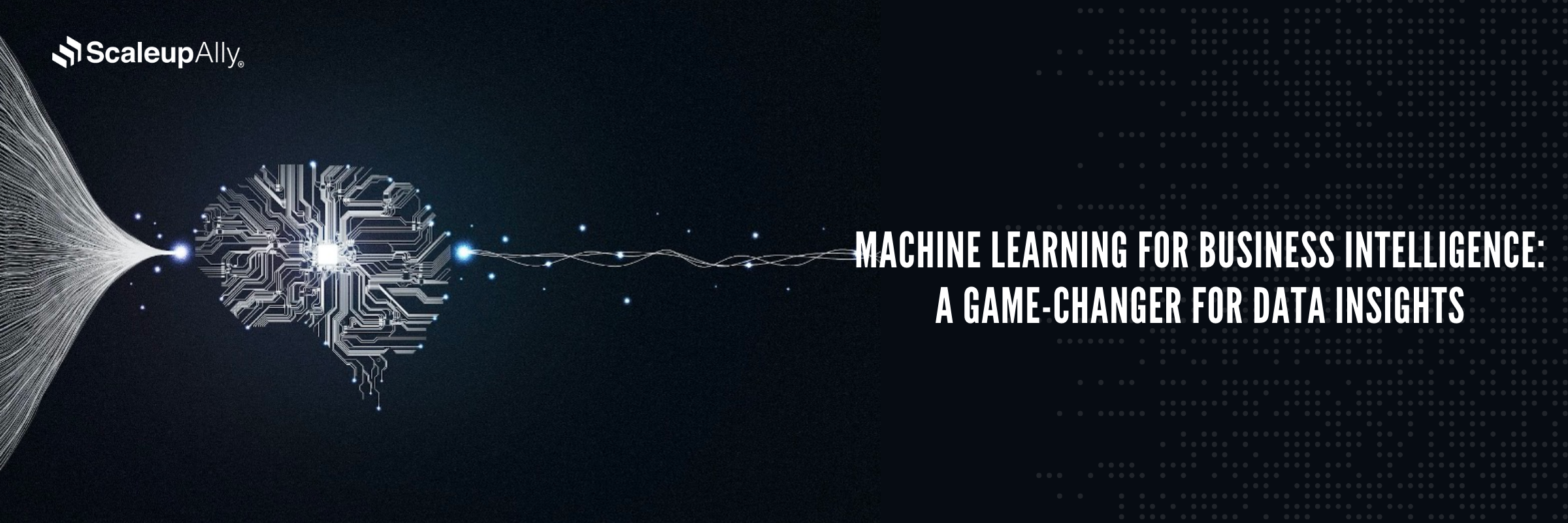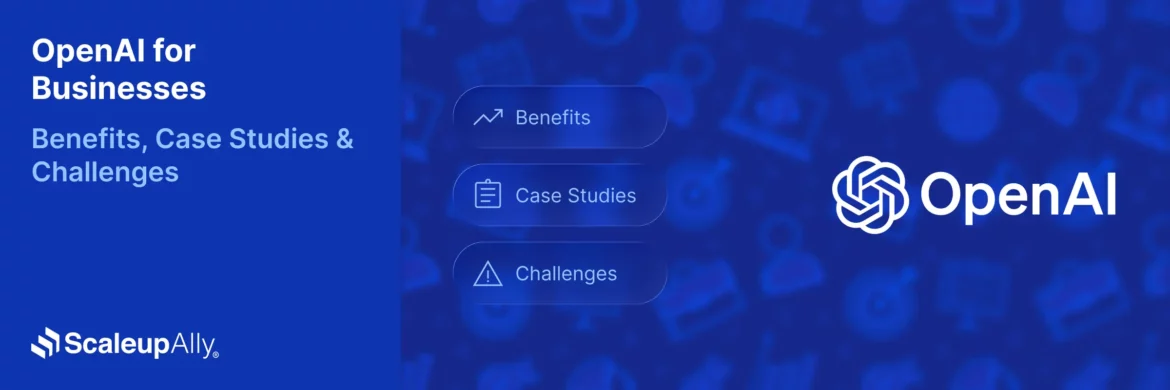
Machine Learning for Business Intelligence: A Game-Changer for Data Insights
ScaleupAlly Team | November 27, 2024 , 10 min read
Table Of Content
In the corporate world today, Machine Learning has become a core component when obtaining insights from the vast amount of data generated daily. With the involvement of business intelligence tools alongside, most businesses are able to maximize their efficiency manyfold.
Both these technologies have paved the way for many new ideas in different industries and made daily processes much easier. To discover how well machine learning and business intelligence work together, we will discuss their potentials in detail in this article.
Key Takeaways
- Machine Learning automates data analysis, boosting Business Intelligence efficiency.
- Predictive analytics and AI uncover hidden patterns for more accurate decision making.
- BI tools with ML offer deeper insights and real-time predictions.
- Combining ML and BI enhances agility, risk assessment, and personalization.
Machine Learning Concepts Used in Business Intelligence
- Machine Learning Concepts Used in Business Intelligence
- How Machine Learning Benefits Business Intelligence?
- Business Intelligence Tools Using Machine Learning
- Challenges When Integrating Machine Learning With Business Intelligence
- Real Life Applications of Machine Learning and Business Intelligence Combined
- Conclusion
- Frequently Asked Questions
Whenever working on the task involving both Machine Learning and Business Intelligence, it is always best to know the concepts that are used beforehand. Some of these most important tasks are described as below:
1. Predictive Analytics:
- Analyzes historical data in order to predict future trends using a variety of Machine Learning algorithms.
- Use in BI – Forecasting sales and identifying customer behavior.
2. Anomaly Detection:
- This concept helps in identifying data points that deviate significantly from the norm.
- Use in BI – Fraud detection and monitoring system performance.
3. Natural Language Processing (NLP):
- Extracts the insights from unstructured data (such as text/speech) and converts into meaningful information.
- Use in BI – Checks the customer sentiment around the product from social media posts, reviews and surveys
4. Time Series Forecasting:
- Predicts the future values from the historical time ordered data
- Use in BI – Helps the company to predict monthly revenue based on past sales data
5. Recommender Systems:
- Uses Machine learning algorithms for analyzing user behavior to provide recommendations based on past behavior or preferences.
- Use in BI – Gives recommendations based on the pattern followed by the customers on different OTT platforms and thereby improving experience.
How Machine Learning Benefits Business Intelligence?
Using machine learning and business Intelligence offers a lot of benefits such as:
1. Increased Automation
Most of the work in Business Intelligence involves data preparation and analysis that can become quite repetitive. The use of Machine Learning alongside helps in automating these tasks that will lower the costs and improve the strategic performance of the business.
2. Enhanced Decision Making
Machine Learning helps in uncovering complex patterns from vast amounts of data that are used in various BI initiatives and provides a deeper understanding of key business drivers that lead to better decisions.
3. Improved Agility
With the ability of Machine Learning to analyze rapidly changing data, businesses are able to quickly respond to market changes. Using Machine Learning with Business Intelligence helps in handling the data with high efficiency and also provides real time insights.
4. Risk Assessment
Integrating machine learning with business intelligence improves risk assessments by determining the likelihood of various risks occurring within an organization and how much time needs to be spent in managing them and optimizing the business efficiency.
5. Personalised Experiences
By analyzing a large amount of data with both Machine Learning and Business Intelligence provides personalized recommendations, targeted marketing campaigns and exceptional customer experiences.
Business Intelligence Tools Using Machine Learning
Some of the popular business intelligence tools that use Machine Learning are described as below:
1. Power BI
Power BI with Machine Learning allows users to create and deploy the models directly within the Power BI environment. It also includes the following features:
- Built in Machine Learning tools in the form of visuals (such as Key Influencers visual).
- Integration with Python and R scripts for custom Machine Learning models.
- Natural language processing (NLP) with Q&A functionality.
2. Tableau
Tableau is another powerful Business Intelligence tool whose integration with machine learning models enables users to make predictions about future trends and patterns based on historical data. The features held by this tool are as follows:
- Explain Data – Utilizes Machine Learning modeling at the click of a button to understand the why behind a data point in the Visual.
- Ask Data – Involves NLP when creating visuals and dashboards by asking questions.
- Analytics Pane – A drag and drop machine learning feature that come with the following uses:
- Predict future outcomes based on historical data with forecasting.
- Determine future trends for your data using various models.
- Understand the relationships between data points with clustering.
3. Qlik Sense
Qlik Sense is a Business Intelligence tool that uses advanced analytics with Machine Learning capabilities to provide automated insights and self-service analytics. The features held by this tool are as follows:
- Identifying hidden patterns in the data using Machine Learning models
- Predictive Analytics and Forecasting
- Enabling users to interact with data using NLP
Challenges When Integrating Machine Learning With Business Intelligence
There are various challenges that occur when Machine Learning is integrated with Business Intelligence, some of which are described as below:
1. Data Quality and Availability
Although Machine Learning can automate data processes, it would require accurate and diverse data in the first place. When using Business Intelligence applications, most organizations often struggle with ensuring data accuracy, completeness and accessibility.
2. Interpretability
The complexity of the Machine Learning models can make the decision making process challenging for most stakeholders. In the Business Intelligence processes, it would be difficult to understand how the given models would arrive at analytics conclusions and would raise concerns about the accuracy, consistency, fairness and transparency of ML-driven decisions.
3. Change Management
The introduction of ML-driven insights into Business Intelligence systems may require significant changes to established workflows, decision-making processes and even the organization’s culture.
4. Ethical Considerations
Model development in Machine Learning raises ethical questions about data privacy, bias and the use of data. Such challenges exist with conventional Business Intelligence systems, but the increased autonomy of Machine Learning tools makes better analytics practices an urgent concern for companies.
Real Life Applications of Machine Learning and Business Intelligence Combined
Machine Learning and Business Intelligence have demonstrated their combined use in most of the areas which are described as below:
1. Retail Industry
Machine Learning equips the retailers with the capability to analyze extensive datasets that include sales transactions, customer interactions, inventory changes, and prevailing market dynamics.
The use of Business Intelligence tools helps in visualizing the given data, enabling retailers to make informed decisions about product placements and promotions.
2. Marketing Campaigns
In Marketing, the combination of both these technologies (ML + BI) helps in customizing the Marketing Campaigns and target potential customers in an unprecedented manner.
With the insights drawn by visualizing the data by using various Business Intelligence tools, many businesses are able to optimize their Marketing performance.
3. Healthcare Sector
With the ever increasing population rate in the present world, there are health concerns that also arise. Machine Learning with Business Intelligence helps the Healthcare Industry in a number of ways as follows:
- The usage of the given technologies can be used to detect brain tumors from the images generated by the MRI scan by identifying the patterns that distinguish one case from the other.
- The big data in the Medical field comes in large volumes in both structured and unstructured ways from different sources. With Machine Learning and Business Intelligence, many healthcare providers are able to aggregate the given data to identify trends and enhance care quality.
4. Chatbots
Chatbots use both Machine Learning and Business Intelligence when you want to learn more about your audience. Such a concept helps many industries understand their pain points and set their goals.
5. Cybersecurity
With the ever increasing amount of data generated daily, cyberattacks have become more common. Both Machine Learning and Business Intelligence play their part in stopping such attacks before they even begin. Businesses benefit greatly from identifying and preventing emerging threats in the early detection phase.
6. Financial services
In Banking and other Financial areas, the use of Machine Learning and Business Intelligence provide insights into the market trends and also the behavior of their customers. The uses that both these technologies have in this sector are as follows-
- Risk Assessment
- Reporting Management
- Performance Analysis
- Cash Flow Management
- Market Research and Competitor Analysis
7. Manufacturing and Supply Chain
A great use for combining both Machine Learning and Business Intelligence is managing Supply Chain Complexity. Manufacturers utilize machine learning to predict equipment failures, optimize supply chain operations and enhance quality control. Also, BI dashboards provide real-time visibility into production metrics helping managers make timely adjustments.
Conclusion
Reaching the end of the article, we understood the importance that Machine Learning and Business Intelligence play in enhancing the efficiency of the businesses. While there are some challenges of integrating both these technologies, we saw how well they play their part in different sectors and provide unique advantages.
We, at ScaleupAlly, provide expertise in business intelligence services for businesses of all sizes. If you are looking for someone like us, connect with us today for your free consultation.
Frequently Asked Questions
Q: What is business intelligence in machine learning?
Business Intelligence in the context of Machine Learning refers to the use of machine learning techniques and algorithms to enhance the process of gathering, analyzing and interpreting business data for deeper insights, predictions and decision making.
Q: What is the relationship between machine learning and business intelligence?
The relationship between Machine Learning (ML) and Business Intelligence (BI) is Interdependent. While Business Intelligence focuses on data collection, analysis and reporting, Machine Learning enhances this process by uncovering hidden patterns and providing predictive insights.
Q: Why is machine learning important in business intelligence?
Machine Learning is critically important in business intelligence as it draws a lot of benefits from large volumes of data which are as follows:
- Enhanced Data Analysis
- Automated Decision Making
- Deeper Insights
- Improved Visualization and Reporting
- Improved Efficiency and Cost Savings
- Scalability
Q: How is AI used in business intelligence?
AI involvement in Business Intelligence (BI) offers advanced and intuitive solutions to meet the challenges of modern business. The real life scenarios for AI use in BI are as follows:
- Retail: helps retailers predict demand and optimize pricing strategies based on customer behavior and preferences.
- Finance: Analyzes financial markets, predicts stock trends and identifies risky investments.
- Healthcare: Analyzes patient data, predicts disease outbreaks and optimize treatment plans.
Author Spotlight
Kaustubh Verma, Data Analyst I
Related Blogs

OpenAI for Businesses [Benefits, Use Cases & Challenges]
Discover the benefits of OpenAI for businesses. From reducing costs to scaling operations and enriching customer experiences. Real-world use cases included.
ScaleupAlly Team
Dec 16 ,
11 min read

Best 11 Agentic AI Tools in UAE: Accelerating Digital Transformation
Discover the top 11 agentic AI tools in UAE for 2025. Explore features, benefits, and tips to choose the right AI tool for your business growth.
Manu Jain
Nov 6 ,
9 min read

How to Choose an AI Development Company in Dubai: A Complete Guide
Find out how to choose the right AI development company in Dubai. Learn key factors, local considerations, and tips to select the best partner.
Manu Jain
Nov 6 ,
9 min read


